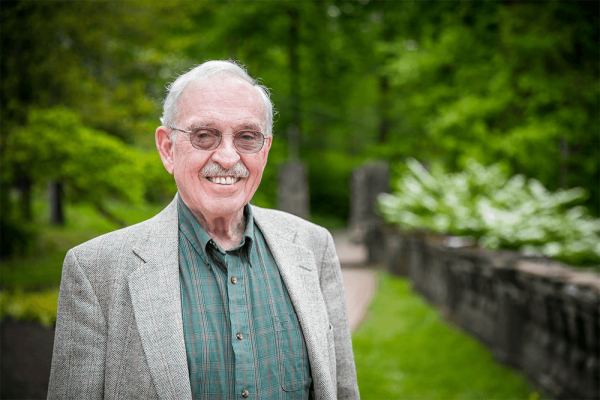Ronald J. Sider, founder of Christians for Social Action and a stalwart evangelical advocate for social justice, died of a cardiac arrest on July 27. He was 82 years old.
Sider’s deep commitment inspired numerous Christian leaders and activists. His 1977 book, Rich Christians in an Age of Hunger, was named one of the hundred most influential books in the 20th century by Christianity Today and sold over 400,000 copies, according to Christians for Social Action.
Friends and co-laborers of Sider’s told Sojourners that his humility, steadfastness, and leadership would be missed.
“I was so impressed with how earnestly he lived out the values he talked about — justice, honoring all people, peace-making, the centrality of Jesus, and partnership,” Nikki Toyama-Szeto, the current executive director for Christians for Social Action, wrote in an email. “He was such a unique leader — he was strong in his convictions but always open to engage with challenges. I will miss his example — especially in these times of great divide.”
Evangelicals for Social Action
In 1973, Sider helped convene a group of Christian leaders in Chicago to write and sign “The Chicago Declaration of Evangelical Social Concern,” including John Perkins, Carl Henry, Jim Wallis, and Wes Granberg-Michaelson. Four years later, Sider founded Evangelicals for Social Action (the organization changed its name in 2020).
Granberg-Michaelson, a former general secretary for the Reformed Church in America and current Sojourners board member, wrote in an email that Sider’s “voice within the evangelical community was never more needed than today, and his loss is grievous.” He said Sider’s direct identification as an evangelical was a strength to his work.
“He had credibility [with evangelicals] and influenced the statements of social concern and justice from the National Association of Evangelicals,” Granberg-Michaelson wrote.
Sider was a scholar and activist, who saw it was his life's work to bridge the gap between public understanding and the biblical, ethical, and economic expertise needed to end hunger. He was a former contributing editor for this publication, and regularly wrote for outlets like Christianity Today and Plough on poverty, nonviolence, and Christian ethics.
“At the supreme moment of history, when God took on human flesh, we see the God of Israel still at work liberating the poor and oppressed and summoning God's people to do the same,” Sider wrote in the October 1977 issue of Sojourners. “[Biblical texts] insist that God casts down the wealthy and powerful--precisely because they became wealthy by oppressing the poor and because they failed to feed the hungry.”
Toyama-Szeto told Sojourners that people should follow Sider’s willingness to learn from and amplify liberation theology.
“Ron modeled out a posture, of divesting from power and privilege, to create space for voices from the margins,” Toyama-Szeto said. “Ron learned so much from theologians in Latin America and worked to help the American church hear this message. Particularly in the pursuit of justice, North American Christians would do well to follow his example.”
Shane Claiborne, a peace activist and co-founder of Red Letter Christians, wrote that Sider was a “core part” of Red Letter Christians’ work.
“Every time I was with Ron, I felt like I got smarter,” Claiborne told Sojourners in an email. “But he did not just shape my mind… he shaped my faith… he held together things that Christians too often separate — like Jesus and justice, faith and works, evangelism and social transformation.”
Shifts in evangelicalism
In the last several years of his life, Sider maintained a commitment to evangelicals, even as they moved away from him. When Christians for Social Action changed their name in 2020, Sider wrote that the organization’s name became an obstacle because of the political connotations of “evangelical.”
“[T]he larger society thinks of evangelicals not as people committed to Jesus Christ and the biblical gospel but as pro-Trump political activists,” Sider wrote. “The result is that ESA increasingly found that our name failed to communicate who we really are.”
Sider also did not affirm same-sex marriages or relationships. When many of his evangelical contemporaries embraced progressive theologies, Sider remained committed to conservative sexual ethics.
But Sider also hoped for better treatment and inclusion of LGBTQ people in Christian spaces. Christians for Social Action operates “Oriented to Love” workshops, where Christians who disagree on sexual ethics can find space for dialogue and unity on other issues. Sider, who participated in the workshops, wrote that the workshop “deepened my understanding of, and love for, other Christians who disagree with me.”
Sider’s last blog post argued for amending the Equality Act to protect religious institutions while protecting LGBTQ civil liberties.
“By amending the U.S. Civil Rights Act to make LGBTQ people a protected class, it would become illegal to discriminate based on LGBTQ status in housing, employment and public accommodations,” Sider wrote on May 29. “That is necessary and right and all Christians including evangelicals should support that.”
While evangelicals became theologically and definitionally different over his life, Sider never stopped thinking of himself as one.
“I have been an evangelical all my life,” he wrote in 2020 in response to an online commenter who said Sider was not writing from an evangelical perspective. “If you believe that I am mistaken, please pray to our Lord that He help me see more clearly. My deepest desire is to be more like Jesus.”
Got something to say about what you're reading? We value your feedback!






